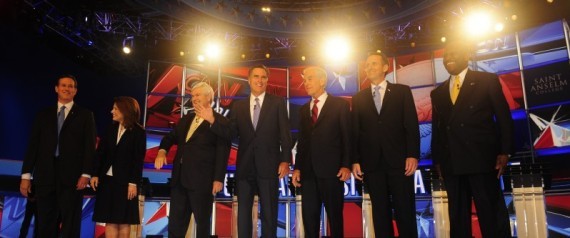I can make it good, I can make it hood, I can make you come, I can make you go! I can make it high, I can make it fly, make you touch the sky, hey maybe so!
Wednesday, August 31, 2011
"AIN'T THAT AMERICA!"
Words.
"Where's Horatio Alger when you need him? When the caucuses and primaries arrive in 2012, Republican voters will be choosing among candidates who embody the promise of American life. Rick Perry and Michele Bachmann, both of whom came from humble beginnings, exemplify the continued possibility of social mobility. And Mitt Romney leads the life that many of us would like to have: wealth, a large family and multiple homes.
What none of these candidates has done so far, though, is champion a social mobility agenda. How are Perry, Bachmann and Romney going to help their struggling fellow citizens rise from the bottom of the heap to the top? They don't say.
That's a shame, because the candidates' own biographies suggest the template for such an agenda. Look at the current top prospects for the nomination. On one side are the self-made populists: Perry grew up poor in rural Texas, sold reference books door to door while studying at Texas A&M and flew C-130s in the Air Force before going into agriculture.
A child of divorce, Bachmann worked her way through college, graduate school and beyond, even as she found time to raise five kids and care for 23 foster children.
Say what you will about them, but neither candidate is a trust funder.
...These Republican candidates have great stories to tell about achieving success through education and hard work. Yet they are more interested in bashing President Obama's record, rolling back the healthcare overhaul and controlling federal spending.
And their policies — cutting the corporate, income, dividend, capital gains and estate tax rates, imposing a moratorium on regulations, reducing frivolous lawsuits — favor investment capital over human capital.
...The question facing the Republican candidates, then, is this: How do we align economic and social incentives in a way that fosters independence and drive?"
LOS ANGELES TIMES: Where do Republicans stand on social mobility?
Tuesday, August 30, 2011
Wake Me When It's Over.
A "New Flava in Ya Ear!" Production starring The Dream.
POP DUST: Hear "Wake Me When It's Over," The-Dream's Lead 1977 Track
POP DUST: Hear "Wake Me When It's Over," The-Dream's Lead 1977 Track
Monday, August 29, 2011
Friday, August 26, 2011
Thursday, August 25, 2011
"My life, my life, my life, my life."
FILE UNDER: Quote of the Day
"I hate my 20s, if I'm being honest. Being teenage is a breeze, and by your 30s (I anticipate; I fucking hope) you've had a chance to work things out a little, but in your 20s you're stuck between "it's time to grow up, be an adult" and "but you're still so young, you shouldn't settle, live your life". (Waaah, waah, waaaaah, I know)." -Los Campesinos' Gareth Campesinos
PITCHFORK: 96-01-06-11: Part Two
"I hate my 20s, if I'm being honest. Being teenage is a breeze, and by your 30s (I anticipate; I fucking hope) you've had a chance to work things out a little, but in your 20s you're stuck between "it's time to grow up, be an adult" and "but you're still so young, you shouldn't settle, live your life". (Waaah, waah, waaaaah, I know)." -Los Campesinos' Gareth Campesinos
PITCHFORK: 96-01-06-11: Part Two
Wednesday, August 24, 2011
Tuesday, August 23, 2011
Monday, August 22, 2011
Infinite Jest.
Calamity Song.
A video.
Starring The Decemberists.
NPR: ALL SONGS CONSIDERED: First Watch: The Decemberists, 'Calamity Song'
A video.
Starring The Decemberists.
NPR: ALL SONGS CONSIDERED: First Watch: The Decemberists, 'Calamity Song'
Saturday, August 20, 2011
Midnite Vulture.
Pitchfork: Are there any of your albums that maybe didn't get the reception you wanted when they first came out and that you would want to reissue now?
B: Yeah, a less obvious one would be Midnite Vultures because that was originally recorded as a double album. There must have been 25 songs that were left behind, and about two thirds of them are finished. Until recently, I hadn't heard those songs in about 10 years. A lot of them were on hard drives from the late 90s, and it took me several years to find a specialist who could get them to work with a modern computer, because some of them were made in old operating systems with programs that nobody knows how to use anymore.
A lot of [the outtakes] are probably better off not having seen the light of day-- some arguments could be made for the album itself being better left in the vault, too. But it was an experiment and all the things that were recorded during that time were of a piece. There was a specific sound and idea behind it.
Pitchfork: That album is actually a favorite of mine.
B: Oh really? I don't think I've heard that from anybody before.
PITCHFORK: Beck: 15 Years
Friday, August 19, 2011
Thursday, August 18, 2011
Canary in a Coalmine.
Words.
"THE great Calvin Coolidge reputedly said that “the business of America is business.” These days the business of America is carpet-chewing rage. American politicians are intent, not on improving their country’s competitiveness, but on gouging each other’s eyes out.
...Optimists argue that S&P’s decision may act as a wake-up call. Yet in Washington it is being treated as another battle cry, with Republicans raging about “the Obama downgrade” and Democrats railing against “tea-party terrorists”. The roots of America’s current polarisation are distressingly deep. The parties have reorganised themselves along ideological lines, as white conservatives have abandoned the Democrats and northern liberals the Republicans. The ideological factions have built mighty propaganda machines stretching from Washington think-tanks to the studios of Fox and MSNBC. And ideologues have resorted to previously taboo weapons, such as the threat of default.
...The civil war is creating two obvious problems for American business: paralysis and uncertainty. The Obama administration is still pockmarked with vacancies because Congress refuses to approve routine appointments. Important trade deals have been languishing for months. The Republicans are fighting a war of attrition against Barack Obama’s health-care reforms and his new Consumer Financial Protection Bureau.
...The direst consequences of all this lie in the future, however. America’s health-care system consumes a sixth of GDP but produces only mediocre results. America’s schools produce run-of-the-mill results despite generous funding. The immigration system leaves 11m people in the shadows and condemns many of the brightest graduates of American universities to years of grovelling before bureaucrats if they want to stay in America. Many give up and take their skills back to India or China.
...American companies are sitting on a gigantic pile of cash; Apple alone has $76 billion in the bank. Why won’t corporate America invest in America? It does not help that domestic demand is feeble, and that the global economy is in turmoil. But American politicians deserve some of the blame.
...Even more dangerously, the gulf between business and the rest of the country is widening: opinion polls show that American businesspeople are losing faith in their country even as ordinary Americans are losing faith in business. Calvin Coolidge’s statement was once denounced as the height of bourgeois complacency. Today it sounds like a reminder of an America that is in danger of disappearing."
THE ECONOMIST: American idiocracy
Wednesday, August 17, 2011
TELEVISION TELEVISION!
Another morning. Another workout. Another viewing of a music video from an act getting its feet wet/trying to grab our attention/stand out in the crowd. Worthy of a repeat listen? Press play and find out...
New flava in MY ear!
Wallpaper.
#STUPiDFACEDD.
New flava in MY ear!
Wallpaper.
#STUPiDFACEDD.
Same Script, Different Cast.
Words.
"Texas governor and Republican presidential candidate Rick Perry can resist the comparison all he wants, but he’s more like George W. Bush than George W. Bush.
The comparisons were unavoidable. They’ve both been Texas governors. They’re both fluent in Bubba, and both unapologetically have been brought to their knees by Jesus Christ. The last two categories hardly constitute a lonely hearts club. If you are born again in the GOP, you have friends.
...Upon meeting Perry, you can’t help thinking that he’s just like Dubya. They share not only the same speech patterns, but they also have that same je ne sais quoi that corresponds to the way a confident Southern male asks a girl to take a spin around the dance floor: “Wanna dance?”
There’s something slightly lazy in the mouth, half a smile, a knowing look. Both share a devil-may-care, towel-snapping streak — an attitude that either connects them to their quarry or sends their prey howling into the outer darkness. The same things that drove liberals mad about George W. will repeat themselves with Perry.
It’s that certitude mixed with bravado. It is also, dare I say, their certain brand of manliness. Weathered, creased and comfortable in jeans, they convey a regular guyness that everyday Americans relate to. Take it or leave it, it happens to be true..."
THE WASHINGTON POST: Enter Rick ‘Dubya’ Perry
Tuesday, August 16, 2011
Monday, August 15, 2011
Friday, August 12, 2011
TAKEN.
A Moment of Clarity.
Words.
"Has market turmoil left you feeling afraid? Well, it should. Clearly, the economic crisis that began in 2008 is by no means over.
But there’s another emotion you should feel: anger. For what we’re seeing now is what happens when influential people exploit a crisis rather than try to solve it.
...the fact is that right now the economy desperately needs a short-run fix. When you’re bleeding profusely from an open wound, you want a doctor who binds that wound up, not a doctor who lectures you on the importance of maintaining a healthy lifestyle as you get older. When millions of willing and able workers are unemployed, and economic potential is going to waste to the tune of almost $1 trillion a year, you want policy makers who work on a fast recovery, not people who lecture you on the need for long-run fiscal sustainability.
Unfortunately, giving lectures on long-run fiscal sustainability is a fashionable Washington pastime; it’s what people who want to sound serious do to demonstrate their seriousness. So when the crisis struck and led to big budget deficits — because that’s what happens when the economy shrinks and revenue plunges — many members of our policy elite were all too eager to seize on those deficits as an excuse to change the subject from jobs to their favorite hobbyhorse. And the economy continued to bleed.
What would a real response to our problems involve? First of all, it would involve more, not less, government spending for the time being — with mass unemployment and incredibly low borrowing costs, we should be rebuilding our schools, our roads, our water systems and more. It would involve aggressive moves to reduce household debt via mortgage forgiveness and refinancing. And it would involve an all-out effort by the Federal Reserve to get the economy moving, with the deliberate goal of generating higher inflation to help alleviate debt problems.
The usual suspects will, of course, denounce such ideas as irresponsible. But you know what’s really irresponsible? Hijacking the debate over a crisis to push for the same things you were advocating before the crisis, and letting the economy continue to bleed."
THE NEW YORK TIMES: The Hijacked Crisis
Words.
"Has market turmoil left you feeling afraid? Well, it should. Clearly, the economic crisis that began in 2008 is by no means over.
But there’s another emotion you should feel: anger. For what we’re seeing now is what happens when influential people exploit a crisis rather than try to solve it.
...the fact is that right now the economy desperately needs a short-run fix. When you’re bleeding profusely from an open wound, you want a doctor who binds that wound up, not a doctor who lectures you on the importance of maintaining a healthy lifestyle as you get older. When millions of willing and able workers are unemployed, and economic potential is going to waste to the tune of almost $1 trillion a year, you want policy makers who work on a fast recovery, not people who lecture you on the need for long-run fiscal sustainability.
Unfortunately, giving lectures on long-run fiscal sustainability is a fashionable Washington pastime; it’s what people who want to sound serious do to demonstrate their seriousness. So when the crisis struck and led to big budget deficits — because that’s what happens when the economy shrinks and revenue plunges — many members of our policy elite were all too eager to seize on those deficits as an excuse to change the subject from jobs to their favorite hobbyhorse. And the economy continued to bleed.
What would a real response to our problems involve? First of all, it would involve more, not less, government spending for the time being — with mass unemployment and incredibly low borrowing costs, we should be rebuilding our schools, our roads, our water systems and more. It would involve aggressive moves to reduce household debt via mortgage forgiveness and refinancing. And it would involve an all-out effort by the Federal Reserve to get the economy moving, with the deliberate goal of generating higher inflation to help alleviate debt problems.
The usual suspects will, of course, denounce such ideas as irresponsible. But you know what’s really irresponsible? Hijacking the debate over a crisis to push for the same things you were advocating before the crisis, and letting the economy continue to bleed."
THE NEW YORK TIMES: The Hijacked Crisis
Upward Mobility.
Words.
"It’s sobering that three-fourths of Americans, according to a new Washington Post poll, have little or no confidence in our elected leaders to solve the nation’s economic problems. At this point, though, it’s hardly surprising.
If anything, we should be shocked and alarmed that 26 percent of our fellow citizens apparently believe the president and Congress are going to make it all better. Are they not paying attention? Or are they delusional?
...The survey by The Post shows that while officials in Washington may be clueless in the face of economic turmoil, most of their constituents see things quite clearly. Seven out of 10 respondents said the federal government is “mostly focused on the wrong things” — and blamed Democrats and Republicans for this misdirected focus in precisely equal measure.
How many times does this message have to be delivered? In poll after poll, Americans have said their top concern is the jobs crisis. Unemployment is at 9.1 percent. The worst economic slowdown since the Great Depression robbed the nation of 9 million jobs, and only a fraction have been replaced. The economy is adding jobs at a snail’s pace that doesn’t even keep up with growth of the potential workforce.
Jobs. The issue is jobs.
...Here we are, with interest rates at or near historical lows. The federal government, despite suffering a credit downgrade to AA-plus from Standard & Poor’s, is able to borrow as much money as it wants at an absurdly low cost. Meanwhile, we have a large and growing backlog of infrastructure needs. Roads, bridges and dams need to be repaired; new airports need to be built and old ones refurbished; we need to upgrade the electrical grid to take advantage of new energy sources that do not depend on fossil fuels.
Putting two and two together, you might expect the president and Congress to design and implement a nationwide project of infrastructure renewal that would put Americans back to work, spark a burst of growth and leave us with tangible assets that would increase our competitiveness in the global economy.
But you’d be disappointed. And you’d lose faith in the ability of officials to respond to a crisis they don’t even seem to notice.
The disconnect between what the nation cares about and what its leaders care about seems to widen day by day. Hello? Is anybody in Washington listening? Does anybody even care?"
THE WASHINGTON POST: Clueless in Washington
Thursday, August 11, 2011
Subscribe to:
Comments (Atom)














































